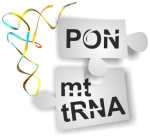PON-mt-tRNA
PON-mt-tRNA is a posterior probability-based tool for classification of human mitochondrial tRNA (mt-tRNA) variations.
It predicts the probability of pathogenicity using 20 machine learning (ML) predictors. The predicted probability is used as
prior probability to integrate the evidence submitted by the user.
If no evidence is submitted, PON-mt-tRNA classifies the variations based on ML predicted probability.
The ML predictors utilize features representing evolutionary conservation, sequence context, secondary structure and tertiary interactions.
Balanced accuracy and Matthews correlation coefficient (MCC) for integrated classifier based on posterior probability are 0.99 and 0.95,
respectively and for ML predictor based probability of pathogenicity are 0.81 and 0.56, respectively on independent test dataset.
PON-mt-tRNA is trained using variations that were classified previously by using evidence-based classification method by Yarham et al.
Paper link
Citation
Abhishek Niroula
and
Mauno Vihinen.
PON-mt-tRNA: a multifactorial probability-based method for classification of mitochondrial tRNA variations.
Nucleic Acids Res
. (2016) 44(5): 2020-2027.
Paper link
Comment and feedback
The server is maintain by Haoyang Zhang. If you have questions, add an issue at
our Github
or send an email to haoyang.zhang@med.lu.se

Submit queries to PON-mt-tRNA
PON-mt-tRNA requires variation location, and the reference and altered nucleotides separated by comma (csv). In addition, the users can submit evidence of segregation,
biochemical test and histochemical test which are optional. The evidence should be submitted in the following manner:
Example input
POS,REF,ALT,Segregation,Biochemistry,Histochemistry
7505,A,G
7505,A,G,1
8300,T,C,NA,1,NA
7316,T,C,0,NA,1
7316,T,A,0,NA,0
7316,T,C,1,1,1
7316,T,A,NA,NA,NA
7316,T,C,0,0,0
Note
POS, REF, ALT
mtDNA location, Reference nucleotide, Altered nucleotide
Segregation
1: Segregation of variation with disease
0: No segregation with disease
NA: Not available
Biochemistry
1: Biochemical defect in complexes I, III or IV
0: No biochemical defect in the complexes I, III and IV
NA: Not available
Histochemistry
1: Histochemical evidence of mitochondrial disease
0: No histochemical evidence of mitochondrial disease
NA: Not available
The evidence should be submitted in the order Segregation, Biochemistry and Histochemistry.
If evidence of Segregation is not known but others are known, NA should be used for segregation and then other should be provided.
Multiple variations can be submitted in a single query. PON-mt-tRNA only classifies the single nucleotide substitutions and therefore
does not accept other types of variations as input. Alternatively, a file containing the variations in the same format as described above can be uploaded.
PON-mt-tRNA output
The result is like:
mt-tRNA Variation ML_probability_of_pathogenicity Evidence Posterior_probability_of_pathogenicity Classification
Ser(UCN) 7505,A,G 0.46 NA, NA, NA Likely neutral
Ser(UCN) 7505,A,G 0.46 1, NA, NA 0.66 VUS
Lys 8300,T,C 0.45 NA, 1, NA 0.87 VUS
Ala 5644,T,C 0.56 0, NA, 1 0.56 VUS
Ala 5644,T,A 0.56 0, NA, 0 0.01 Likely neutral
Ala 5644,T,C 0.56 1, 1, 1 0.99 Pathogenic
Pro 15984,A,T 0.52 NA, NA, NA Likely pathogenic
Pro 15984,A,C 0.52 0, 0, 0 0.0 Neutral
The result file contains the following contents:
1. mt-tRNA affected by the variation
2. Variation
3. ML probability of pathogenicity based on 20 ML predictors. It ranges from 0 to 1.
4. Evidence submitted by the user.
5. Posterior probability of pathogenicity after combining the ML predicted probability of pathogenicity and evidence submitted by the user. It ranges from 0 to 1.
6. Classification of variation. The classification is based on posterior probability if there is a posterior probability for the variation in column 5. Otherwise, the classification is based on ML predicted probability of pathogenicity in column 3.
Disclaimer
This non-profit server, its associated data and services are for research purposes only. The responsibility of Protein Structure
and Bioinformatics Group, Lund University is limited to applying the best efforts in providing and publishing good programs and data.
The developers have no responsibility for the usage of results, data or information which this server has provided.
Liability
In preparation of this site and service, every effort has been made to offer the most current and correct information possible.
We render no warranty, express or implied, as to its accuracy or that the information is fit for a particular purpose, and will not
be held responsible for any direct, indirect, putative, special, or consequential damages arising out of any inaccuracies or
omissions. In utilizing this service, individuals, organizations, and companies absolve Lund University or any of their employees
or agents from responsibility for the effect of any process, method or product or that may be produced or adopted by any part,
notwithstanding that the formulation of such process,
method or product may be based upon information provided here.
